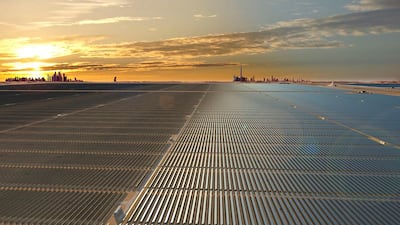Energy systems around the world are undergoing fundamental transformations that will change the world as we know it.
The pace of change is accelerating significantly as more people, societies and governments become aware of the extent of damage that the emissions from fossil fuels have on our environment.
The Middle East and Africa are ideally placed to be at the forefront of this energy and technological revolution, but further bold leadership, investment, and decisiveness are required to capture the potential that this transformation will provide.
Renewables are expected to provide about 30 per cent of global power demand in 2023, up from 24 per cent in 2017, according to the International Energy Agency. That pace needs to pick up even more if we truly want to mitigate the effects of global warming.
As the cost of renewable energy drops, it becomes a more viable competitor to conventional energy production.
According to Irena, solar photovoltaic prices based on competitive procurement could average $0.039 per kilowatt-hour for projects commissioned next year, down 42 per cent compared with last year and more than 20 per cent less than the cheapest fossil-fuel competitor.
We have already seen record-low auction prices for solar PV systems in the UAE, Chile, Ethiopia, Mexico, Peru and Saudi Arabia, where values were as low as $0.03/kWh.
Though each country is at a different stage in the energy transition journey, the ultimate goal is for zero emissions and 100 per cent clean energy.
Such a transformation will not happen overnight and not all countries can realistically move straight to renewables.
We need to act now, accept interim solutions, always with the overarching goal in mind: creating a reliable, cheap and carbon dioxide-free energy supply for all people.
Coal currently accounts for around 40 per cent of the world’s energy production. A shift from coal to gas can significantly reduce carbon dioxide emissions. Gas technology will play a fundamental role in energy transition to balance the fluctuating supply of renewable energy and stabilise electricity grids.
Gas turbines are a sustainable investment, running with natural gas now and with carbon-neutral hydrogen in the future. Industrial gas turbines can already today co-fire up to 60 per cent of green hydrogen with modern dry low emission combustion systems.
Greater incentives from governments and partnerships with the private sector would help propel our transition towards a greener world. While some countries are still in the early phases of their energy transition, switching to cleaner gas burning for electricity as opposed to coal or oil burning, others are way ahead, proving the feasibility of renewable projects and new energy projects with industrial-scale projects.
The UAE is breaking ground with its green hydrogen project, the first in the Mena region. This collaboration between Siemens Energy, the Dubai Electricity and Water Authority and Expo 2020 Dubai, will be the region’s first solar-driven hydrogen electrolysis plant.
Covering an area of 10,000 square metres, the plant aims to test and showcase an integrated megawatt-scale system to produce hydrogen using solar PV cells, store the gas and then use it for re-electrification, mobility or other industrial uses.
The UAE is using advanced technology to help reduce emissions and improve efficiency. A recent control system upgrade at Dewa’s Jebel Ali power plant, combining a digital twin with artificial intelligence, is ensuring that the gas turbines undergo constant performance rejuvenation.
This makes it possible, for the first time, to compensate for age-related performance losses in real time. As a result, the performance of the turbines has been increased by up to 3.5 megawatts each, and nitrogen oxide emissions have fallen by as much as 10 per cent.
Saudi Arabia, the world’s top oil exporter, is another big regional player looking to diversify away from oil and move into the green hydrogen business. Its futuristic megacity of NEOM is set to be the world’s most advanced energy hub which will be fully powered by renewable energy, with forward-looking storage and transport solutions.
In the interim, the kingdom is looking at gas solutions as it invests and puts into effect technology to upgrade its existing turbines and enable them to use gas and eventually hydrogen, instead of crude oil for fuel.
These are promising changes that are shaping the future of energy and the transformation to a greener world.
Dietmar Siersdorfer is Middle East and UAE managing director at Siemens Energy

